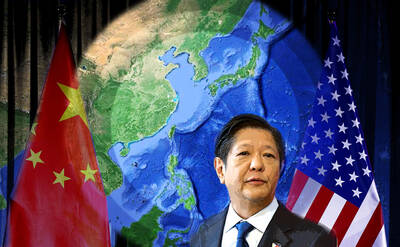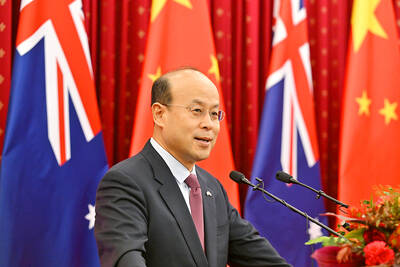
A few weeks ago I found myself at a Family Mart talking with the morning shift worker there, who has become my coffee guy. Both of us were in a funk over the “unseasonable” warm weather, a state of mind known as “solastalgia” — distress produced by environmental change. In fact, the weather was not that out of the ordinary in boiling Central Taiwan, and likely cooler than the temperatures we will experience in the near-future. According to the Taiwan Adaptation Platform, between 1957 and 2006, summer lengthened by 27.8 days, while winter shrunk by 29.7 days. Winter is not only warmer, it is also much shorter. Both the number of days with heavy rain, and days with no rain have increased too. Overall, Taiwan gets less rain than it used to. Sea level rise around the island is over 3.5mm annually and accelerating. HOT WATER Although the world’s nations have pledged to hold warming to 1.5°C over pre-industrial levels, last year’s heating shattered all records. It is a terrifying augury of the future. As a paper out in the journal of the American Meteorological Society just this month observed, the extreme sea surface temperatures in the North Atlantic “lie at the fringe of the expected mean climate change for a global surface-air temperature warming level (GWL) of 1.5°C, and closer to the average at a 3.0°C GWL.” Last year’s warming was beyond all previous experience: in July and again in September “the observations were four standard deviations larger than the 1982–2011 average.” Other recent papers on mean sea temperatures show that ocean temperature levels are the highest ever recorded by science. Some September within the next decade or two we can expect the first ice-free arctic in human history. One reason that the numbers don’t penetrate is because the UN Intergovernmental Panel on

In the mainstream view, the Philippines should be worried that a conflict over Taiwan between the superpowers will drag in Manila. President Ferdinand Marcos Jr observed in an interview in The Wall Street Journal last year, “I learned an African saying: When elephants fight, the only one that loses is the grass. We are the grass in this situation. We don’t want to get trampled.” Such sentiments are widespread. Few seem to have imagined the opposite: that a gray zone incursion of People’s Republic of China (PRC) ships into the Philippines’ waters could trigger a conflict that drags in Taiwan. Fewer still have imagined that the PRC might choose that as an alternative to opening a PRC-US conflict by directly attacking Taiwan and Japan. WAR GAMES Last month Robert Kitchen, a naval expert with the Royal Navy Strategic Studies Center, published a review of war games of the PRC Taiwan scenario. Kitchen observes that before 2020, war games tended to end in a victory for the US side. Then, between 2020 and 2022, the pendulum shifted to the PRC. “Finally,” he notes, “in the two games since Feb. 22, 2022, the immediate insights from the larger Russian invasion of Ukraine have tilted the outcomes towards the defender.” The PRC games this too, and they are likely seeing the same trends the western war games are showing: high costs, immense destruction, global economic disaster, PRC defeat. Recall that the PRC goal isn’t just interested in annexing Taiwan. It also demands Diaoyutai Islands (釣魚台) — called the Senkaku Islands in Japan — and Okinawa, has been eyeing the Batanes Islands in the Bashi Channel between Luzon and Taiwan, wants to solidify its control over the South China Sea, and then move on its next round of expansion. India? Korea? Regardless, we are not in for a

When Alexander’s armies conquered cities in the east, they reconfigured their narratives to give their new territories foundational myths, so as to incorporate them into the Greek world. For example, after Tarsus in Cilicia (now Turkey) — later connected with Paul of the New Testament — was conquered, many Greeks moved there. In response, Greek thinkers quickly made up stories of how the city had originally been settled by Greeks from Argos and how its origin was connected to the myths of Zeus and Europa. This helped legitimize the Greeks as locals, not outsiders. There was a “sudden proliferation” of foundation myths that linked newly acquired towns and cities of Cilicia to Greek mythology, according to Tanja Scheer writing in A Companion to the Hellenistic World, as Alexander extended the Hellenistic world across the East. As the end neared for the Manchu Empire at the turn of the 20th century, so too did Han Chinese nationalist thinkers begin reconfiguring stories. For instance the Yellow Emperor — a mythical sovereign and culture hero whose legend stretched back to the Warring States period (260BC) — was promoted to become the ancestor of all Chinese. This was a deliberate anti-Manchu move: many Chinese revolutionaries saw the Manchus as outsiders and barbarians who were not fit to rule over China. The Yellow Emperor was thus reconfigured as a symbol of nationalist resistance. After 1911, however, as the nascent Republic of China (ROC) began to swallow the territories of nearby peoples, the Yellow Emperor’s role shifted again, becoming the ancestor of the Manchus, Mongols, Hui, Han, and Tibetans, who constituted the five “Chinese races.” While westerners might identify with Alexander’s conquests and the expansion of Greek culture, sympathizing with the political necessity to reframe national narratives to fit new boundaries, where the People’s Republic of China (PRC)

In 2001 then-president George Bush said in an interview for ABC’s Good Morning America that he would do “whatever it took to help Taiwan defend herself.” When asked whether the US had an obligation to defend Taiwan and whether he would defend the island, Bush answered “Yes, we do ... and the Chinese must understand that. Yes, I would.” There was a furor. Fast forward a few years. By the end of the Bush administration a US$12 billion backlog in US weapons sales to Taiwan had accumulated. The Bush administration, angling for People’s Republic of China (PRC) cooperation in the Middle East and elsewhere, was delaying arms sales — a classic case of the usual PRC leveraging of US needs to trade a transient favor for a permanent gain. A de facto “arms freeze” had been imposed, widely discussed in the media and complained about by US officials who had to deal with the real world, like the US Pacific Command (PACOM) then-commander, admiral Tim Keating, who mentioned the go-slow on arms for Taiwan in a speech at the Heritage Foundation in July of 2008. DOING THE PRC’S DIRTY WORK Those of you with long memories might recall that the Chen Shui-bian (陳水扁) administration had requested 66 F-16s from the US, a move the pro-PRC Chinese Nationalist Party (KMT) supported even as it gleefully used the arms freeze to criticize the Chen administration. Although typically the State Department, always eager to front for Beijing, was at fault in pro-PRC moves like the arms freeze, the Nelson Report, the Beltway insider report, blamed president Bush*. Bush was followed by Barack Obama, whose famous “pivot” turned out to be more talk than walk, and whose Asia officials were drawn from Wall Street firms that did business with the PRC. The result was that
